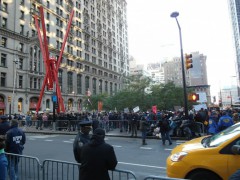The THEY, the GREATER WE and the smaller me

I just came back from Occupy Wall Street at Liberty Square in Manhattan. There were thousands of people – but only thousands! Why weren’t there tens of thousands? After all, a city like New York should be able to mobilize far more people then just enough to fill a small park squeezed in between skyscrapers.
Besides the obvious explanation – that New Yorkers are basically too busy to protest – I think the deeper reason is that New Yorkers – and for that matter Americans, Westerners, and the greater part of the world population including developing countries (who am I to blame them?) – are still entrenched in an outdated economic model and do not see the need for a deep rooted paradigm change.
For a while now, and especially since the OWS events, I have been wondering about the compulsiveness with which corporations and the people who represent them are always trying to deplete every resource they encounter and squeeze every penny out of anybody who comes their way.
I found a very concise answer to this in Jacinta Escudos’ blogpost “Small is better for a Greater We” here in Future Challenges [thank you, Jacinta], which refers to the economist E.F. Schumacher who developed a set of principles he called “Buddhist economics”.
In his seven points on “The differences between Western Economics and Buddhist Economics”, he explains simply and strikingly the underlying principles of the “THEY” – the corporations – and what kind of thinking could or should be the foundation for the “GREATER WE”. For instance: “…The second significant difference is that Western Economists give importance to maximizing profits and individual gains while the underlying principle of Buddhist Economists is to minimize suffering (losses) for all living or non- living things…”
What we need is cultivation of corporate social responsibility. But this can only happen if the people at the head of corporations start thinking and acting in a socially responsible manner.
Instead for clamoring for ever higher GNP we must start thinking along the lines of the seventh point of difference in “Buddhist Economics”: “Western economics gives importance to the gross national product whereas Buddhist economics gives importance to gross national happiness”.
THE GREATER WE starts with a smaller me
– As difficult and far-fetched as this seems to be (just kidding).
There is a lot of talk about strategies, policies and ways to achieve a GREATER WE, a common higher level of consciousness and acting. But few of the advocates actually talk about what they are doing themselves – as individuals – to achieve a GREATER WE via a smaller me.
Chandran Nair summarizes our state of mind poignantly: our awareness is at an all time high, but our state of denial matches our awareness.
In other words, I have to take the first step. Not you, not they, but I.
To achieve my smaller me, I’ve taken a few humble steps, the most important in my opinion was to finally become a vegetarian last year – something I’ve been meaning to do for the past 25 years. Other steps include avoiding buying goods and foods packed in plastic wherever possible, using environmentally friendly cleaners in my small guest house, and being an generally ‘conscious consumer’.
A very good starting point to evaluate one’s own needs and wants is this article about simple living. Towards the end, James Robertson is cited saying “that the shift to sustainability is likely to require a widespread shift of emphasis from raising incomes to reducing costs”. As simple as that.
Here’s another great little article about “Having, Needing and Wanting”.
“Buddhist Economics” also talks about the “Middle Way of Living”. The concept of the “Middle Way” says that time should be divided between working towards consumption and meditation and that the optimal allocation between these two activities will be when some meditation is used to lower the desire for consumption and be satisfied with lesser consumption and the work that it involves.
Of course the best way to implement this kind of thinking is to start with children: “…The Bent Given by Education Will Determine All That Follows…”
The filmmaker David Lynch goes a step towards the “Middle Way of Living” with his foundation where he has successfully introduced Transcendental Meditation into hundreds of schools.
– WEITERMACHEN (“Continue” – as seen on Herbert Marcuse’s gravestone)
Tags: awareness, buddhist economics, sustaiability, transformation



